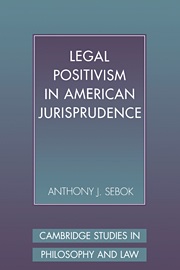Book contents
- Frontmatter
- Contents
- Acknowledgments
- 1 Why Study Legal Positivism?
- 2 Positivism and Formalism
- 3 The Varieties of Formalism
- 4 Legal Process and the Shadow of Positivism
- 5 The False Choice Between the Warren Court and Legal Process
- 6 Fundamental Rights and the Problem of Insatiability
- 7 New Legal Positivism and the Incorporation of Morality
- Index
5 - The False Choice Between the Warren Court and Legal Process
Published online by Cambridge University Press: 16 October 2009
- Frontmatter
- Contents
- Acknowledgments
- 1 Why Study Legal Positivism?
- 2 Positivism and Formalism
- 3 The Varieties of Formalism
- 4 Legal Process and the Shadow of Positivism
- 5 The False Choice Between the Warren Court and Legal Process
- 6 Fundamental Rights and the Problem of Insatiability
- 7 New Legal Positivism and the Incorporation of Morality
- Index
Summary
WECHSLER AND NEUTRAL PRINCIPLES
Thus far, the theory of reasoned elaboration seems both workable and attractive. Yet it is apparent that despite the presence of The Legal Process in the Harvard curriculum, its reputation as a theoretical text and even a teaching material has declined. Not only has Hart and Sacks's theory lost its audience, but it has developed a distinct and unsavory reputation as a theory steeped in “conservatism and procedural fetishism”. One might wonder how The Legal Process came to merit this reputation; the answer is found in the fact that in the eyes of many observers, Hart and Sacks's theory met “a formidable opponent” – and not an ally – “in the Warren Court.” Thus, we must turn toward an episode in the history of legal process that, although central to the argument of this book, has not yet been mentioned: Herbert Wechsler and the theory of neutral principles.
Wechsler's 1959 Holmes Lecture, entitled Towards Neutral Principles of Constitutional Law, was published at the same time as Hart's Foreword. It is probably the most important of the legal process writings, not because it is the best (clearly The Legal Process itself best expresses its own theory) but because it applied reasoned elaboration to the most pressing problem in constitutional law at the time – racial equality under the federal constitution – and, by assuming that challenge, drew the attention of a wide audience of lawyers and nonlawyers.
- Type
- Chapter
- Information
- Legal Positivism in American Jurisprudence , pp. 179 - 216Publisher: Cambridge University PressPrint publication year: 1998

